As a teacher at high school, my everyday work is to use my imagination so as to make the topics that we discuss in class more interesting and comprehensible by the students. The work of a teacher is , as I use to say, a “full time job”, because nothing only begins or ends inside the walls of the classroom. I usually have to think about what happened or about what is going to happen during all my day before and after class…to stretch my mind in order to cum up with new ideas and projects …to be creative and use all my weapons (stories, music, films, paintings, my body…) during learning.
So, I want to describe a little project in which I forced myself and my students to use our imagination and creativity more than usual. The topic under discussion was the inequalities in our society and the idea that we do not share the same rights and opportunities even though we officially “own” the same.
Firstly, I had to invent and built a scenario of working this theme outside classroom and without books. I thought that it would be nice to use our familiar space and I chose as our “stage” the schoolyard; a specific spot where a ramp is located from ground level to a higher. Then, I proposed different roles for each student and they shared these roles (e.g. emigrant adult student, child from Nigeria, owner of a company, child of a politician, refugee in a camp in Lesvos, farmer…etc). Then I gave them one week to adopt their roles and I asked to imagine their lives according to their roles/characters, to search things in web, to bring to the class the music they probably would listen to, to draw how imagine their clothes, their home, their friends, their working/school places… we created collages and we all heard narrations of each other about our new imaginary life.
Then I organized the central action in the schoolyard. That was the moment that I pushed my limits to explore a new way of teaching and learning at the same time. I prepared questions such as … “Do you have the opportunity to travel abroad?”, “Do you have the money to study?”, Do you feel safe?”… I lined up the kids at the same starting point at the bottom of the ramp. The also held in their hands a paper with the name of their role. The concept was; when the listened the questions to answer with a yes or no using their bodies; yes=one step forward, no=stay where I am. So, during this process we saw in front of our eyes that others were climbing up and others staying stacked. The gap was obvious and we all felt that our characters were ourselves. The gap was now constructed with our bodies and it was really moving when we realized that this was not a game but reality. Or …if the game is like this, how hard is reality?!
When the questions ended we all gathered at the bottom, in a circle and discussed about democracy, human rights, laws and reality. The following week, we all wrote stories from the aspect of our character, some wrote poems, others songs. Some of them decided to write articles for the press.
That little project was repeated somehow in our Erasmus+ project during the meeting in Almeria, where a lot of refugees live.
That period of time, I couldn’t stop thinking about how I could design the project better or how we could use what we learnt or spread what we felt to the others and to the local communities. Personally, I used this experience to come closer to refuges living in Mytilene or in Athens and I started trying to feel in their shoes.
I am not an artist and surely if I were I could do much more or come up with more ideas. That’s what I expect from this program; to learn how to use my imagination and creativity more intensively and effectively in the class on favor of society.
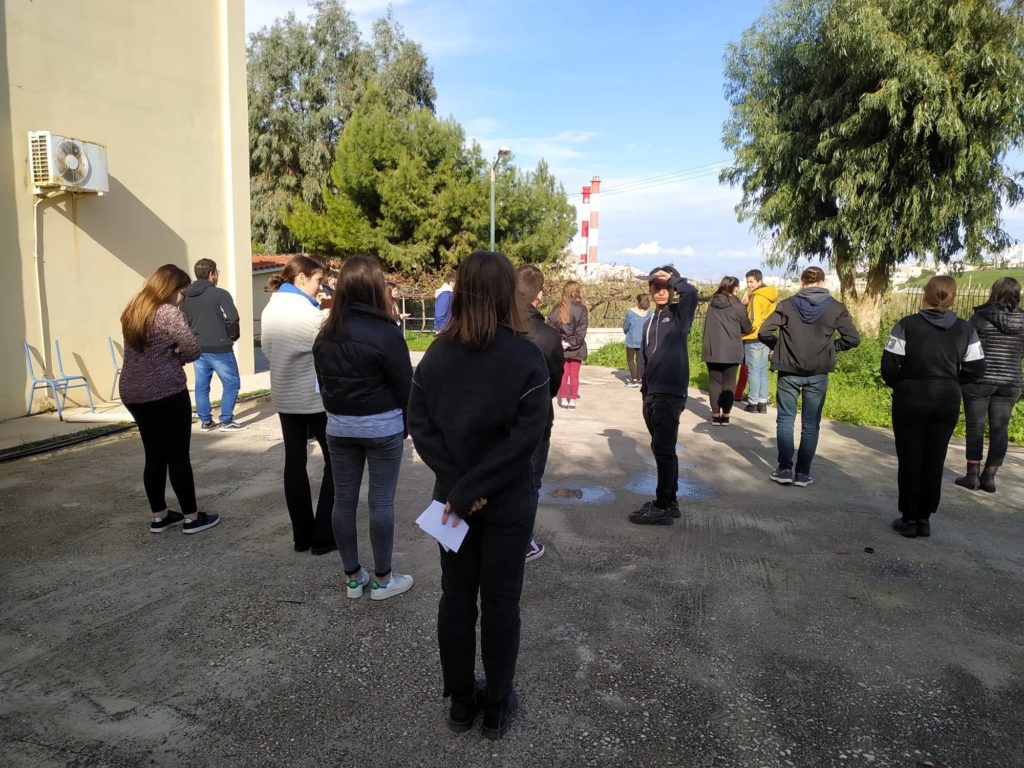
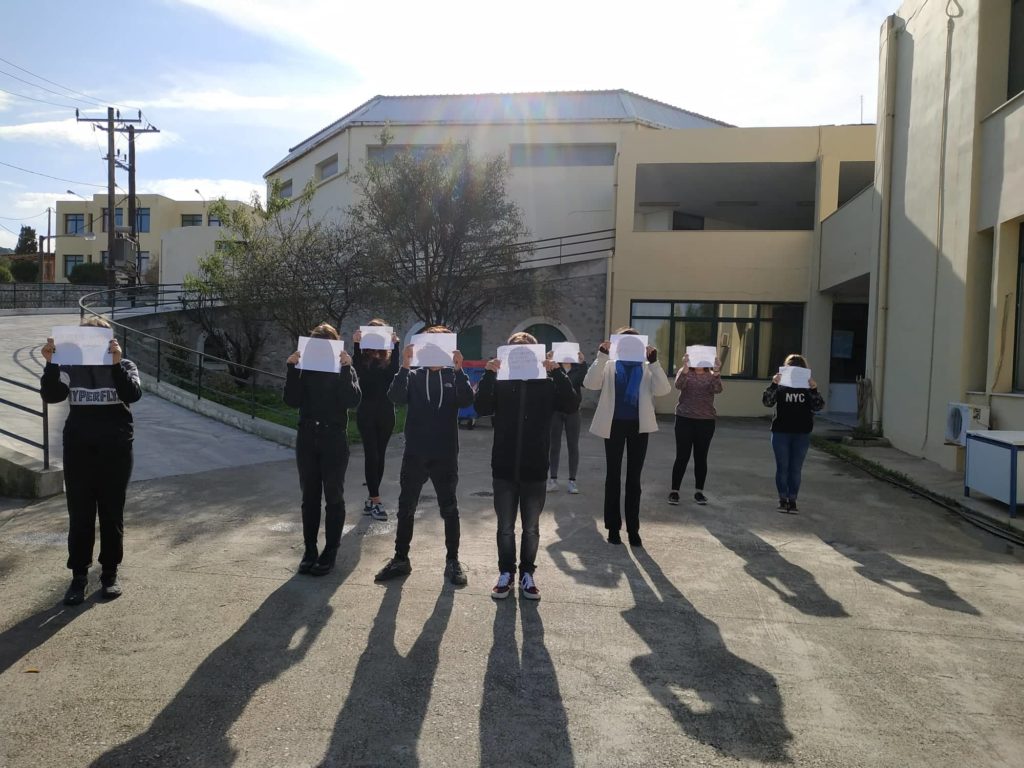
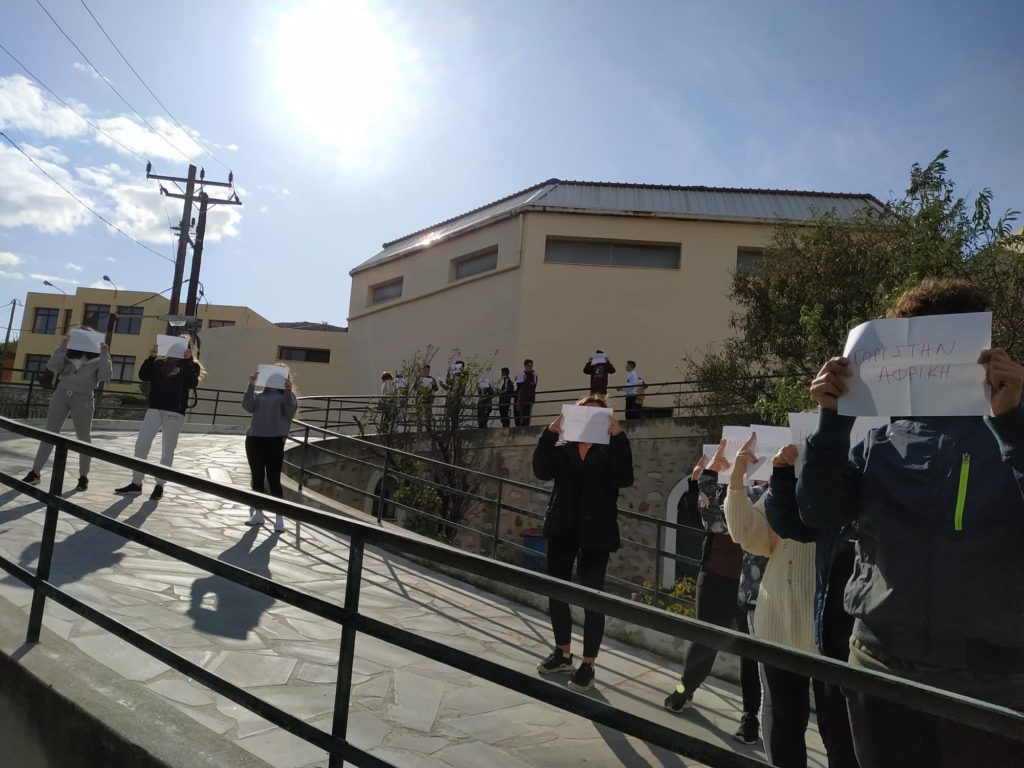
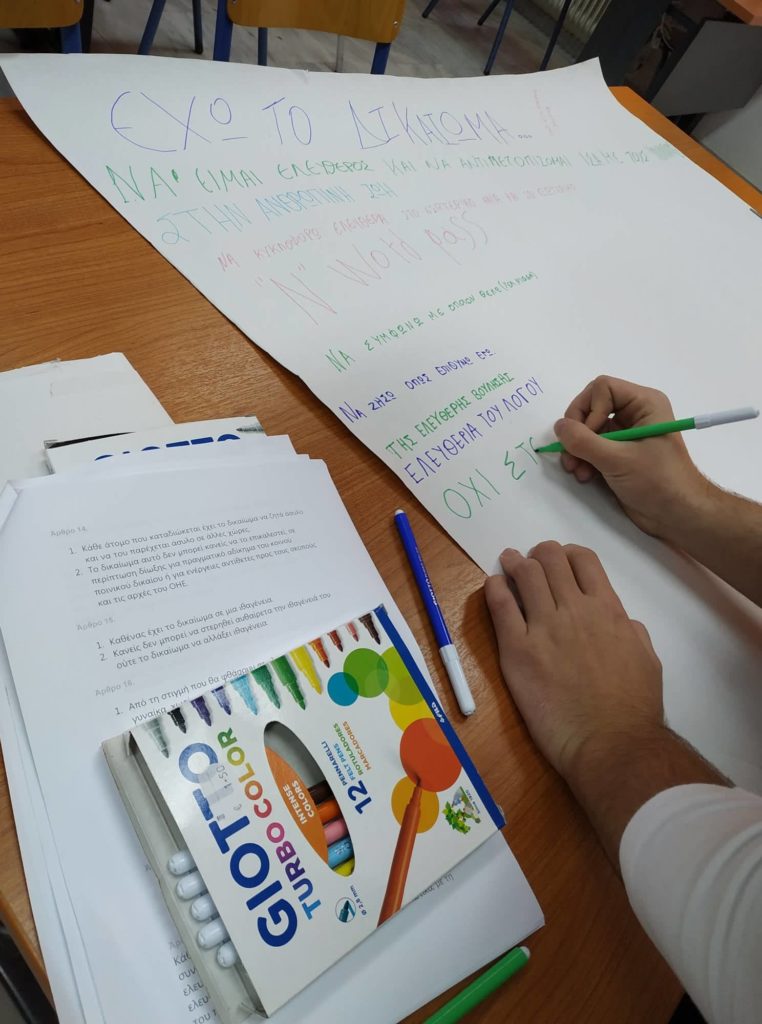
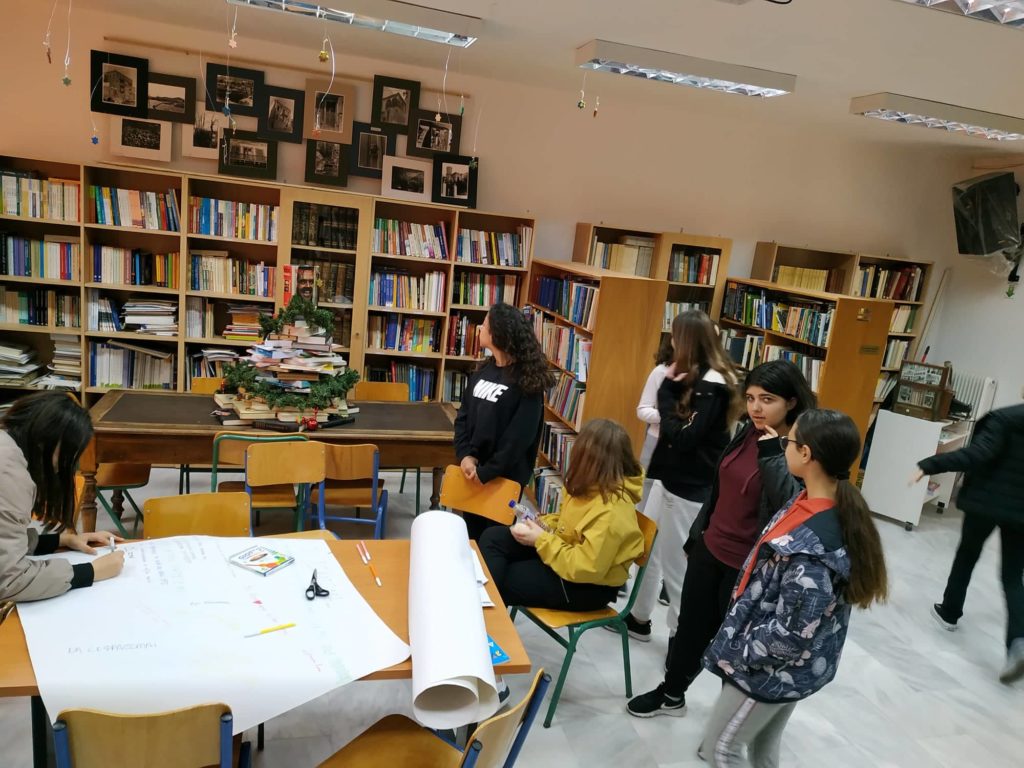
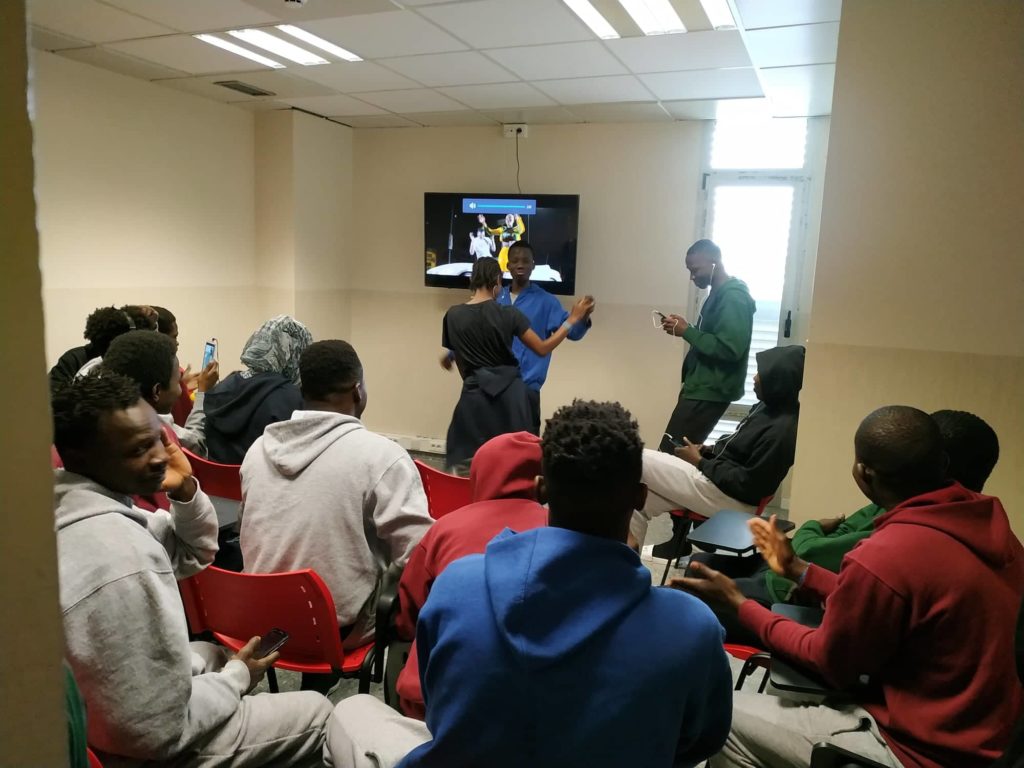
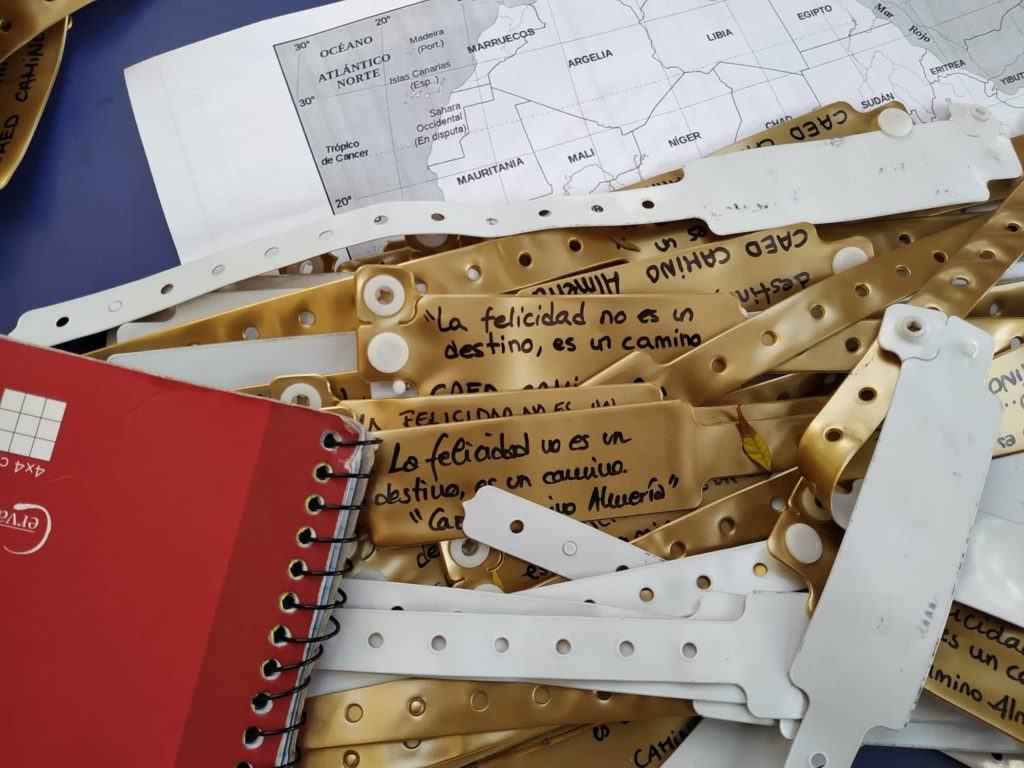
Dear Eleni,
this is a wonderful example of arts-based research in the fields of education and migration. It would be great if you developed your thoughts further and proposed a similar working project among all of us, as well as members of local communities, during our stay in Lesvos.
Panos
Thank you Panos! Yes, I will try of course with your help and see if it’s possible. In reality that was the first concept that crossed my mind when I saw the programme’s announcement.
Hi Eleni,
I really like your approach to a subject that is very sensitive and therefore very difficult to deal with and talk about, especially with such a young audience. Like you, I too am convinced of the importance of a playful, participative and embodied approach to get certain concepts across, but also to allow everyone to play a decisive role in the debate, taking part in it with their whole person. I too have worked with young people for a number of years and I know that every time it is a creative challenge to involve them in an interesting and interested way. This experience reminds me a lot of the workshops I did with some kids in Brussels, in my case we used video as a meeting point between the first immigrant generations and the new generations born in Belgium but with parents or grandparents from other countries. Some beautiful stories emerged, but first of all their desire to get involved and speak out.
Thank you for sharing!
Thank you Annagrazia! As it seems, we have a lot to share and talk about in Lesvos! It would be great if somehow we managed to combine our experiences and create an action related to this topic.
Just reading about this was powerful, so it must have been a strong experience for your students. They are lucky to have you as a teacher who is brave enough to do this important work. The personal, societal and educational benefits from this project seem so multitudinous. I especially liked how you let them have and research characters and roles, since it makes it easier to regulate how personal it becomes both in terms of being exposed and a safer distancing of any sudden private revelations.
Maggi, thank you for your supportive comment! Yes, it’s the first, safer as you noticed,step if later they want to envolve more.
Dear Eleni
Very good pedagogical and educational project about differences in social structures. I’m sure all of your students will remember this project in retrospect as something special. If you have any of the articles that the students wrote, I would like to read them in English.
Elena this is beautiful. I am inspired by your efforts as an educator to use your imagination and to push your own limits to create experiential modes of learning for your students. I agree with Panos that I very much hope you can bring some of these ideas to Lesvos. I look forward to learning more from you in our time together! Congrats on your creative pedagogical practices.